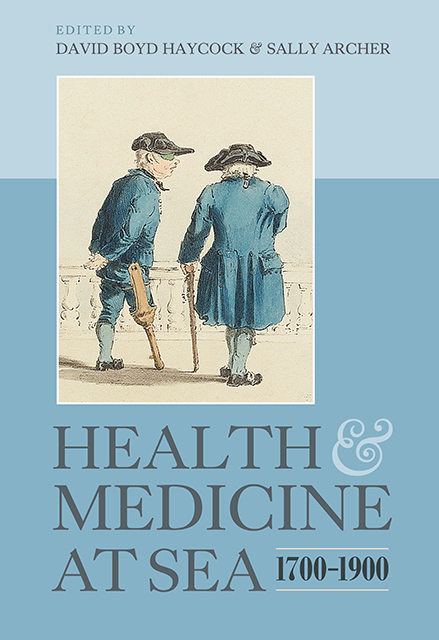Book contents
- Frontmatter
- Contents
- List of Figures and Tables
- Preface
- List of Contributors
- Acknowledgements
- List of Abbreviations
- Introduction Health, Medicine and the Maritime World: A History of Two Centuries
- 1 ‘The Intention is Certain Noble’: The Western Squadron, Medical Trials, and the Sick and Hurt Board during the Seven Years War (1756–63)
- 2 Royal Navy Surgeons, 1793–1815: A Collective Biography
- 3 Surgery in the Royal Navy during the Republican and Napoleonic Wars (1793–1815)
- 4 The Sick and Hurt Board: Fit for Purpose?
- 5 An ‘Important and Truly National Subject’: The West Africa Service and the Health of the Royal Navy in the Mid Nineteenth Century
- 6 Mortality and Migration: A Survey 128
- 7 Slave Purchasing Strategies and Shipboard Mortality: Day-to-Day Evidence from the Dutch African Trade, 1751–1797
- 8 Ships, Families and Surgeons: Migrant Voyages to Australia in the Age of Sail
- 9 Medical Encounters on the Kala Pani: Regulation and Resistance in the Passages of Indentured Indian Migrants, 1834–1900
- Bibliography
- Index
1 - ‘The Intention is Certain Noble’: The Western Squadron, Medical Trials, and the Sick and Hurt Board during the Seven Years War (1756–63)
Published online by Cambridge University Press: 07 March 2023
- Frontmatter
- Contents
- List of Figures and Tables
- Preface
- List of Contributors
- Acknowledgements
- List of Abbreviations
- Introduction Health, Medicine and the Maritime World: A History of Two Centuries
- 1 ‘The Intention is Certain Noble’: The Western Squadron, Medical Trials, and the Sick and Hurt Board during the Seven Years War (1756–63)
- 2 Royal Navy Surgeons, 1793–1815: A Collective Biography
- 3 Surgery in the Royal Navy during the Republican and Napoleonic Wars (1793–1815)
- 4 The Sick and Hurt Board: Fit for Purpose?
- 5 An ‘Important and Truly National Subject’: The West Africa Service and the Health of the Royal Navy in the Mid Nineteenth Century
- 6 Mortality and Migration: A Survey 128
- 7 Slave Purchasing Strategies and Shipboard Mortality: Day-to-Day Evidence from the Dutch African Trade, 1751–1797
- 8 Ships, Families and Surgeons: Migrant Voyages to Australia in the Age of Sail
- 9 Medical Encounters on the Kala Pani: Regulation and Resistance in the Passages of Indentured Indian Migrants, 1834–1900
- Bibliography
- Index
Summary
Awarded the Julian Corbett Prize for Research in Modern Naval History, University of London
The Royal Navy's importance to British victories during the Seven Years War, Britain's first global war of empire (1756–63), can hardly be overstated. Triumphs such as Quebec in 1759 and 1760 and Havana in 1762 are best described as amphibious operations. Indeed, as Richard Harding defines amphibious warfare in the eighteenth century as ‘a mode of action in which a military force, capable of being fully maintained at sea, is dispatched to accomplish specific objectives on enemy territory’, it is difficult to find a military action during the war that was not at least dependent upon naval power. Closer to home, the strategy of the Western Squadron is credited with both protecting colonial military operations and trade, and ending French naval power.
More particularly, as the Western Squadron could operate successfully only by maintaining the health of its men, stationed at sea for long periods, historians have credited the success of British imperial forces during the Seven Years War to the naval administration's procedure of sending out fresh provisions. Here, I re-examine the operation of the Western Squadron in the light of contemporary medical practice and theory. I begin by discussing the health of seamen and the obstacles to maintaining it within the context of the development of Western Squadron operations during the eighteenth century. I then focus on the health of the Squadron during the Seven Years War and especially on the effect fresh victuals had on rates of sickness. This examination demonstrates that the initiative of fresh provisions was provisional and precarious. The Sick and Hurt Board and the Admiralty recognized that the sending out of fresh provisions to the Western Squadron was no long-term solution to the problem of maintaining the health of seamen when at sea for extended periods of time. I conclude by examining the correspondence of the Sick and Hurt Board during the period of the Seven Years War, establishing that their medical research into cures and preventatives for scurvy other than fresh vegetables was not based on ignorance, but rather on the search for a cure achievable within the constraints imposed by ships at sea and the practical demands of naval administration.
- Type
- Chapter
- Information
- Health and Medicine at Sea, 1700-1900 , pp. 19 - 37Publisher: Boydell & BrewerPrint publication year: 2009



